Bohui Zhang
Schema Generation for Large Knowledge Graphs Using Large Language Models
Jun 04, 2025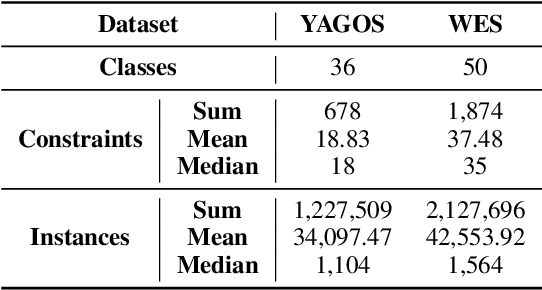
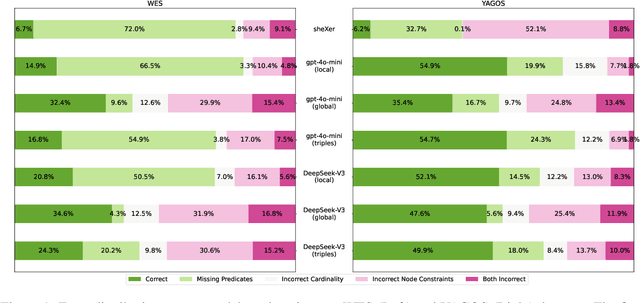
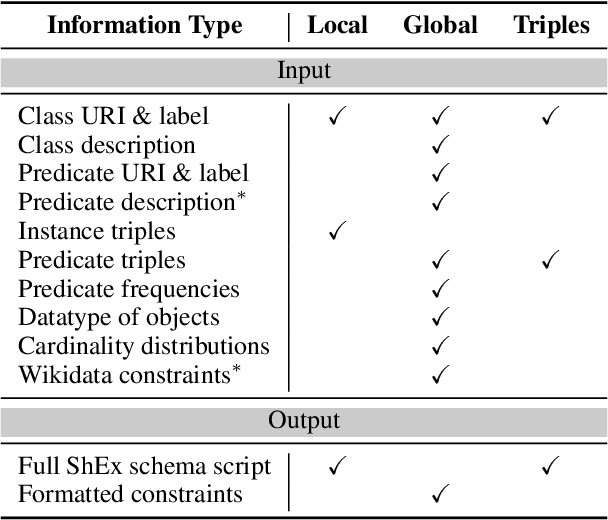
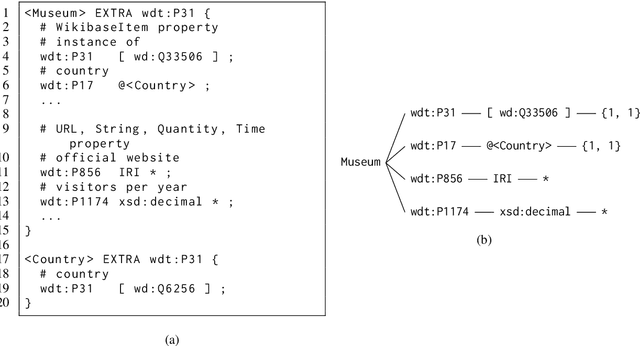
Abstract:Schemas are vital for ensuring data quality in the Semantic Web and natural language processing. Traditionally, their creation demands substantial involvement from knowledge engineers and domain experts. Leveraging the impressive capabilities of large language models (LLMs) in related tasks like ontology engineering, we explore automatic schema generation using LLMs. To bridge the resource gap, we introduce two datasets: YAGO Schema and Wikidata EntitySchema, along with evaluation metrics. The LLM-based pipelines effectively utilize local and global information from knowledge graphs (KGs) to generate validating schemas in Shape Expressions (ShEx). Experiments demonstrate LLMs' strong potential in producing high-quality ShEx schemas, paving the way for scalable, automated schema generation for large KGs. Furthermore, our benchmark introduces a new challenge for structured generation, pushing the limits of LLMs on syntactically rich formalisms.
Semantic Web and Creative AI -- A Technical Report from ISWS 2023
Jan 30, 2025



Abstract:The International Semantic Web Research School (ISWS) is a week-long intensive program designed to immerse participants in the field. This document reports a collaborative effort performed by ten teams of students, each guided by a senior researcher as their mentor, attending ISWS 2023. Each team provided a different perspective to the topic of creative AI, substantiated by a set of research questions as the main subject of their investigation. The 2023 edition of ISWS focuses on the intersection of Semantic Web technologies and Creative AI. ISWS 2023 explored various intersections between Semantic Web technologies and creative AI. A key area of focus was the potential of LLMs as support tools for knowledge engineering. Participants also delved into the multifaceted applications of LLMs, including legal aspects of creative content production, humans in the loop, decentralised approaches to multimodal generative AI models, nanopublications and AI for personal scientific knowledge graphs, commonsense knowledge in automatic story and narrative completion, generative AI for art critique, prompt engineering, automatic music composition, commonsense prototyping and conceptual blending, and elicitation of tacit knowledge. As Large Language Models and semantic technologies continue to evolve, new exciting prospects are emerging: a future where the boundaries between creative expression and factual knowledge become increasingly permeable and porous, leading to a world of knowledge that is both informative and inspiring.
OntoChat: a Framework for Conversational Ontology Engineering using Language Models
Mar 09, 2024Abstract:Ontology engineering (OE) in large projects poses a number of challenges arising from the heterogeneous backgrounds of the various stakeholders, domain experts, and their complex interactions with ontology designers. This multi-party interaction often creates systematic ambiguities and biases from the elicitation of ontology requirements, which directly affect the design, evaluation and may jeopardise the target reuse. Meanwhile, current OE methodologies strongly rely on manual activities (e.g., interviews, discussion pages). After collecting evidence on the most crucial OE activities, we introduce OntoChat, a framework for conversational ontology engineering that supports requirement elicitation, analysis, and testing. By interacting with a conversational agent, users can steer the creation of user stories and the extraction of competency questions, while receiving computational support to analyse the overall requirements and test early versions of the resulting ontologies. We evaluate OntoChat by replicating the engineering of the Music Meta Ontology, and collecting preliminary metrics on the effectiveness of each component from users. We release all code at https://github.com/King-s-Knowledge-Graph-Lab/OntoChat.
Using Large Language Models for Knowledge Engineering (LLMKE): A Case Study on Wikidata
Sep 15, 2023Abstract:In this work, we explore the use of Large Language Models (LLMs) for knowledge engineering tasks in the context of the ISWC 2023 LM-KBC Challenge. For this task, given subject and relation pairs sourced from Wikidata, we utilize pre-trained LLMs to produce the relevant objects in string format and link them to their respective Wikidata QIDs. We developed a pipeline using LLMs for Knowledge Engineering (LLMKE), combining knowledge probing and Wikidata entity mapping. The method achieved a macro-averaged F1-score of 0.701 across the properties, with the scores varying from 1.00 to 0.328. These results demonstrate that the knowledge of LLMs varies significantly depending on the domain and that further experimentation is required to determine the circumstances under which LLMs can be used for automatic Knowledge Base (e.g., Wikidata) completion and correction. The investigation of the results also suggests the promising contribution of LLMs in collaborative knowledge engineering. LLMKE won Track 2 of the challenge. The implementation is available at https://github.com/bohuizhang/LLMKE.
Enriching Wikidata with Linked Open Data
Jul 01, 2022
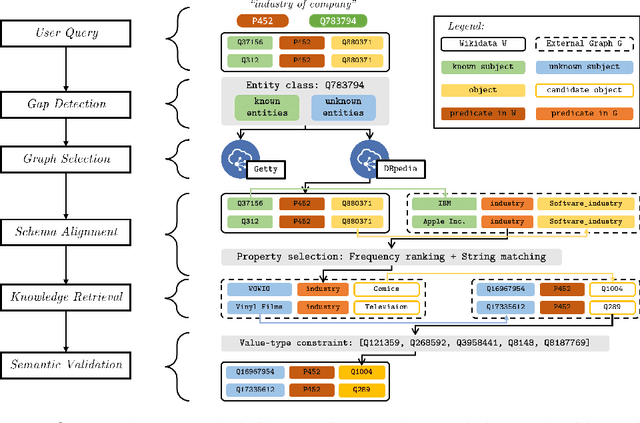
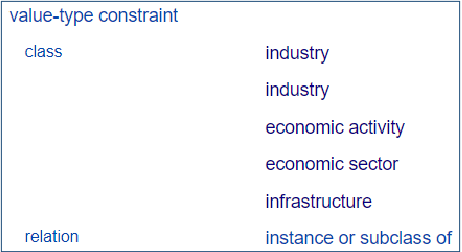

Abstract:Large public knowledge graphs, like Wikidata, contain billions of statements about tens of millions of entities, thus inspiring various use cases to exploit such knowledge graphs. However, practice shows that much of the relevant information that fits users' needs is still missing in Wikidata, while current linked open data (LOD) tools are not suitable to enrich large graphs like Wikidata. In this paper, we investigate the potential of enriching Wikidata with structured data sources from the LOD cloud. We present a novel workflow that includes gap detection, source selection, schema alignment, and semantic validation. We evaluate our enrichment method with two complementary LOD sources: a noisy source with broad coverage, DBpedia, and a manually curated source with narrow focus on the art domain, Getty. Our experiments show that our workflow can enrich Wikidata with millions of novel statements from external LOD sources with a high quality. Property alignment and data quality are key challenges, whereas entity alignment and source selection are well-supported by existing Wikidata mechanisms. We make our code and data available to support future work.
 Add to Chrome
Add to Chrome Add to Firefox
Add to Firefox Add to Edge
Add to Edge